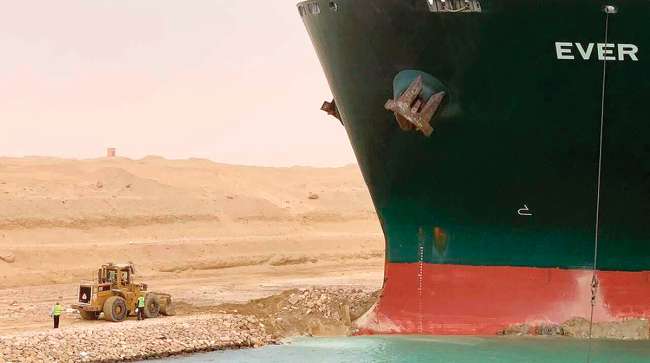Staff Reporter
Suez Canal Blockage Ripples Through Trucking Industry

[Stay on top of transportation news: Get TTNews in your inbox.]
The containership that was blocking the Suez Canal has long since been dislodged, but the ripple effect of the delays it created could be felt across the supply chain for a while, experts said.
“It’s one of those developing stories,” Dean Croke, principal analyst at DAT Solutions, told Transport Topics. “The metaphor of a rippling effect is very appropriate, because most of the experts think that there is a ripple effect that’s going to last well into the summer.”
Croke noted that, during the first three months of this year, 36% of container volume into the Port of New York and New Jersey came from the Suez Canal, along with 22% of volume at the Port of Savannah, Ga.
On March 23, the containership Ever Given became stuck in the southern part of the canal. It took almost a week to free it.
Paul Bingham, director of transportation consulting at IHS Markit, told TT that port slowdowns caused by the blockage are set to propel an influx of activity in the near term.

Bingham
“It’s going to throw off some work availability for some truckers for a period of a week or two,” Bingham said.
Glenn Jones, global vice president of product strategy at supply chain technology developer Blume Global, said turn times at the ports will also be a factor.
“With that huge influx coming in and those containers coming off — the number of containers that have to be moved out, and then the empties back into the terminals — is like four times what it normally is,” Jones told TT. “Hence, if there was a drayage carrier or a trucking company issue before, it was just accentuated right now. And that’s exactly what has happened.”
Bingham noted that beyond the initial impact, the supply chain — truckers in particular — could be playing catch-up for a while longer.
“The repercussions for the truckers are going to last longer,” he said. “They’re already scheduled out — say, a month — to have that vessel come back to Asia, load again, come back to the U.S. again. Well, that vessel is going to stay late. It’s not going to be able to fully catch up to that quickly. And it may be a period of maybe a few months.”
Only 14.3% of the truck driver population is made up of African Americans, followed by 13% Hispanic, and 7% Asian. In this episode, host Michael Freeze wonders what industry leaders are doing to increase those percentages. We talk to two trucking industry experts who have implemented their own practices that are contributing to a more diverse work community. Hear a snippet, above, and get the full program by going to RoadSigns.TTNews.com.
Croke noted that oil shipments and goods such as furniture, plastic wares, auto parts and even bananas are among key items that pass through the canal, which means truckers that haul these goods should be prepared.
“Carriers that are involved in hauling those sorts of things will be impacted,” Croke said.
He also noted that the blockage exacerbated an existing shortage of empty containers, since those on the deck of the Ever Given were unavailable during the blockage. That meant less capacity for truckers to carry freight inland or to load ships.
“That’s why some of our exporters are having trouble trying to get equipment,” Croke said. “The shipping lines have been reluctant to send containers inland and lose a couple of weeks in utilization.”
Glenn Koepke, senior vice president of customer success at supply chain visibility platform FourKites, said congestion at the ports of Los Angeles and Long Beach is also taking a toll on truckers, but he’s hopeful that a reprieve is forthcoming.
“I think that continues to be more disruptive to the ocean trade and ocean buying to the U.S.,” he said. “Will things balance out and smooth once this clears out in three or four months? I think the answer is yes.”
Want more news? Listen to today's daily briefing below or go here for more info:


